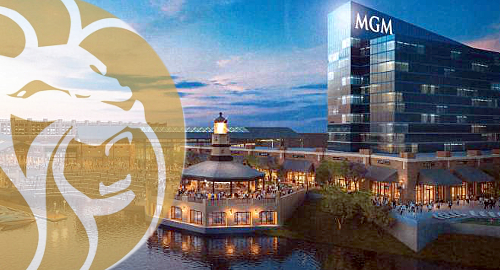 Casino operator MGM Resorts is upping the stakes in its war against two tribal gaming operators by announcing plans to develop a Connecticut gaming venue.
Casino operator MGM Resorts is upping the stakes in its war against two tribal gaming operators by announcing plans to develop a Connecticut gaming venue.
On Monday, MGM announced it had inked a deal with developer RCI Group to build a $600m resort casino in Bridgeport, the largest city in Connecticut. The proposed casino, which would require a license from state regulators, marks a further escalation in MGM’s war against the state’s allegedly preferential treatment of its Mohegan and Mashantucket Pequot tribes.
Appearing at a press conference on Monday, MGM CEO Jim Murrren – a Bridgeport native – said the proposed casino would feature 2k slot machines, 160 table games, a 300-room hotel and a 700-seat theater, along with retail and dining amenities.
Murren said the Bridgeport casino “could turn the economic tide in the state. We just need the political commitment to make that happen.” Bridgeport Mayor Jospeh Ganim, who appeared alongside Murren at the presser, welcomed the idea of bringing 7k jobs to the city and assured MGM that Bridgeport was “behind you 100% to make this happen.”
MGM expects to open its new Massachusetts casino project, the $950m MGM Springfield, one year from now. Connecticut’s gaming tribes, who view the Springfield venue as a threat to their Mohegan Sun and Foxwoods casino properties, convinced state legislators to allow them to launch a joint venture casino operation off tribal lands in East Windsor, just south of the Massachusetts border, as a means to deter northern Connecticut residents from leaving the state to gamble.
MGM claims Connecticut legislators violated the US Constitution by not allowing private operators to bid on the operation of the state’s third casino. But courts have rejected MGM’s legal appeals, in part due to the belief that MGM was never serious about building a Connecticut casino.
Whether MGM is serious or not, Monday’s announcement could bolster its argument in future legal appeals. The tribes have yet to break ground on their East Windsor project, which is still awaiting approval from the federal Bureau of Indian Affairs.
MGM legal eagle Uri Clinton said the Bridgeport project was the only “shovel ready” casino project in Connecticut and the company would press state legislators to rethink their approval of the tribes’ MMCT Venture project in East Windsor.
Andrew Doba, who serves as spokesman for Connecticut’s gaming tribes, called MGM’s proposal the “latest fib” in “a pattern of dishonesty.” Doba warned that approval of a commercial casino operation would violate tribal-state gaming compacts and “immediately end the slot payments that currently sends the state hundreds of millions a year in much needed revenue.”
The two tribes currently pay the state 25% of their slots revenue in exchange for casino exclusivity. However, the tribes agreed to pay the state 25% of all gaming revenue – including gaming tables – from their East Windsor joint venture.
In other MGM news, Monday saw the company launch a new branding campaign intended to reflect its “shift from hospitality and gaming company to global entertainment brand.” MGM’s Murren called the McCann New York-created ‘Welcome to the Show’ campaign “an epic invitation, designed to declare our point of view to the world and tie together our deep and diverse portfolio of resorts.”